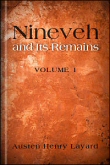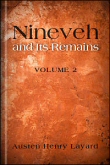Nineveh and Its Remains (2 vols.)
Digital Logos Edition
Overview
In 1845 British world traveler and archaeologist Austen Henry Layard presided over the excavations of Kuyunjik and Nimrud, the ancient Assyrian city located south of Nineveh on the Tigris river in modern Iraq. Here he unearthed the lost palace of Sennacherib (which contained 71 rooms and colossal bas-reliefs) and also discovered the palace and library of Ashurbanipal, which contained over 20,000 cuneiform clay tablets. Nineveh and Its Remains (2 vols.) contains an account of the incredible discoveries of the archeological dig, as well as the trials and tribulations that Layard went through to uncover and preserve these important biblical sites. Along with these page-turning events, Layard includes dozens of plates, charts, illustrations, drawings, and maps.
With the Logos Bible Software edition of Nineveh and Its Remains (2 vols.), you have unprecedented access to the most important scholarly material on the history and culture of the ancient Near East. The powerful search tools in your digital library help you locate the specific material relevant to your study. What’s more, double-clicking any word in any language automatically opens up your preferred lexicons and searches for a match—giving you access to definitions, etymology, and usage examples. These advanced tools make the Logos edition of these key works on the ruins of Assyria an important addition to the libraries of students, scholars, and those wanting to learn more about this fascinating history.

Key Features
- Dozens of illustrations, pictures, and maps
- Full of Scriptural landmarks
- All Scripture references are linked directly to the Bibles in your Logos library
Praise for the Print Edition
Layard's Nineveh is the most valuable work hitherto published in reference to Assyria; and especially its metropolis, Nineveh. The volumes will be carefully studied by scholars, by a numerous class interested in the original Bible narrative, and by all who are desirous of catching the scattered glimpses we can now attain of the state and position in which the patriarchs of the human race dwelt. These are two extraordinary volumes.
—Tait
This is a very extraordinary book, written by a very extraordinary man; and in truth we know not which the more to admire, the work or its author.
—Church of England Review
None have equaled this in its surprising and unexpected and most gratifying revelations; like a brilliant and unlooked-for comet, it has suddenly burst into view, arousing and astonishing, commanding our attention and claiming our admiration. Never was any man's triumph over difficulties more complete, never were discoveries made of greater interest and importance, and never were honor and recompense from his countrymen more richly merited; his untiring industry and perfect disinterestedness, his patience and determination, entitle him to high praise, to the highest we can award, and to something beyond that praise which is given by the lips or the pen.
—Bentley's Miscellany
None can peruse it without admiring the bold and enterprising spirit which he has displayed, as well as the indomitable perseverance, intelligence, and tact with which he has pursued his object. It is rarely that a traveler has such a field to explore—ground so momentous to the student of the history of remote ages. The great and essential value of Mr. Layard's narrative is its straightforward simplicity—the writer's earnest consciousness that the importance of his work was such as to require no adventitious adornment.
—Athenaeum
The most extraordinary work of the present age, whether with reference to the wonderful discoveries it describes, its remarkable verification of our early biblical history, or of the talent, courage, and perseverance of its author.
—Times
There is a remarkable and delightful combination, in the book before us, of valuable discovery and interesting personal narrative, such as we remember in no similar book or discovery. . . .
—Examiner
As a book of travels, the work of our author holds a place among the very best. The story is told in a simple, unambitious, but in a most intensely interesting manner, carrying the reader along with him, causing him to see what the writer saw, and as the writer saw it, making the reader sympathize with the writer in all his troubles and perplexities, or rejoice with him in some unexpected deliverance from impending danger.
—Church Review and Ecclesiastical Register
Product Details
- Title: Nineveh and Its Remains
- Author: Austen Henry Layard
- Publisher: John Murray, 1850
- Volumes: 2
- Pages: 893
Individual Titles

Volume one of Nineveh and Its Remains contains Layard's concise history of Assyria's ruins and the archeological work that was done before his arrival. It then dives headfirst into Layard's explorations of the ancient Assyrian cities he began to unearth, and the dangers he and his workers faced as they began to uncover some of the most biblically important treasures to date.

Volume two continues with Layard's excavations of Kuyunjik and Nimrud—and the discovery of important artifacts that revealed much of the history of Assyria that was previously unknown. Like volume one, volume two contains dozens of drawings, maps, charts, and plates that illustrate some of their findings.
This title is included in the following collections
You can save when you purchase this product as part of a collection.
Logos 7 Diamond Legacy Library
$2,999.99$2,999.99Logos 6 Diamond Legacy Library
$2,999.99$2,999.99Logos 7 Portfolio Legacy Libra...
$4,749.99$4,749.99Logos 6 Portfolio Legacy Libra...
$4,749.99$4,749.99
- $11,399.99
- $11,399.99
About Austen Henry Layard
Austen Henry Layard (1817–1894) was born in Paris—but traveled often in his youth—and was educated in Italy, England, Switzerland, as well as France. He spent six years working for his uncle's law firm, but left to travel and explore the Middle East. After his first successful excavations at Kuyunjik and Nimrud, Layard continued his archeological explorations at the ruins of Babylon and the mounds of southern Mesopotamia. Many of the specimens that he found make up a large part of the collection of Assyrian antiquities in the British Museum. Layard then returned to England, where he took up a life of politics, serving as Under-Secretary for Foreign Affairs and Ambassador at Constantinople. Layard retired in Italy, where he continued to write about Italian art and penned the popular account of his earliest travels, Early Adventures in Persia, Susiana and Babylonia.
Reviews
4 ratings

M. David Johnson
3/27/2015

Faithlife User
11/30/2014
Robert Leahy
5/28/2014

Larry Proffitt (I
11/13/2013